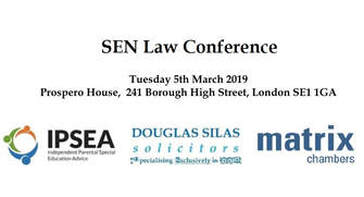|
Firstly, let me wish you all a belated Happy New Year - I hope you have a good and peaceful 2019. This is my first Update of the new chronological year 2019, but it is also important for me to point out that we are now over 1 term of 3 into the new academic year 2018/19. In this SEN Update, you will find sections entitled:
As I always say, I know how busy everyone is, so please feel free to read just the sections that are of interest to you or read everything; the choice is always yours! Don’t forget, to ensure that you never miss out on one, you can get my SEN updates personally by completing your email details below, by using our App ‘SEN.fyi’, or by following me on one of the Social Media platforms that I use, at the top of this page. You can also easily share this update with others (please only do so if it may be relevant to them) by using one of the icons usually to the right or at the bottom of this page, or on our 'SEN.fyi' App (by using the ‘share’ feature at the bottom of the page). HAVEN’T WE BEEN HERE BEFORE? (SEN ISSUES) As I mentioned in my previous Update, the Westminster Education Forum held its annual conference about SEND on 6 December 2018 entitled: ‘The Next Steps for SEND Policy – High Needs Funding, Local SEND Service Provision and Improving Outcomes’.This is almost an annual event these days in the Autumn term. Although I was unable to attend it personally for work-related reasons, I did manage to obtain a transcript of the event afterwards, which has made for interesting reading, so I want to share some things discussed there with you here. There was firstly a presentation from Dr Adam Boddison, the Chief Executive of nasen, entitled: ‘Where Next for SENDPolicy in England?’. In his presentation, Adam talked about some mainstream schools being SEN ‘magnets’, as they are an inclusive school that seems to attract many children with SEN. This is both because parents wanting their child with SEND to go to that school as it is more welcoming (or more happy about their implementation of SEN support), or because other mainstream schools tend to refer to children with SEN to them. But he then also spoke about the fact that a number of these other schools also do this because they realise that if they don’t do it, they may be penalised in some way. Adam also said that, whilst the principles of the new SEND Code of Practice were quite good, in identifying and meeting all the needs, it had tried to be implemented at the time of limited budgets, schools turning into academies and changes to school assessments, so that it has probably been overshadowed. One other thing that got me thinking was when Adam made reference to Ofsted and the fact that he did not think that mainstream schools should be rated as ‘Outstanding’, if they were not inclusive. In fact, he pointed to one school now graded as ‘Outstanding’ by Ofsted, even though it had not had a SENCO in place for 5 years! Overall, he felt that, at the moment, schools are judged on a very narrow set of academic outcomes and he felt this needed to be broader. He also pointed out the fact that ‘progress’ should not merely look at academic attainment, as children with SEN may not be able to make the same academic progress as others, but the progress they were making was still very important and should be recognised. All in all, I felt that Adam’s presentation neatly set up the Conference and the other speakers who were there. There were further presentations from a member of the Parliamentary Education Select Committee, who are currently conducting an Inquiry into SEN, a presentation about joint Ofsted/CQC local area inspections and one about creating effective EHC Plans for young people with SEND (from the user’s perspective). There were also a couple of panel discussions. Most people seemed to be highlighting problems with the SEN system. However, the end of the conference had a presentation from the well-known and respected Brian Lamb, who chaired The Lamb Inquiry in 2009 looking into parental confidence in the SEN system and who is the current chair for ‘Achievement for All’. Brian’s presentation was entitled: ‘Priorities for the development of SEND provision in England’ and he started by saying that, as he had been was listening to the other speakers talk about the problems with the current system, that he had been taken back to 2005/2006 and the Education Select Committee’s Inquiry where they found that parents were really unhappy and that the SEN system was not working, because there were too many exclusions, too many Tribunals etc. Brian pointed out that, although there were still many problems, we seemed to be only focussing on the difficulties and not recognising that there had been some improvements and felt that any parents would now not want to go back to the old system. However, he did recognise that there was still a lot of work to do and that there were still a lot of Local Authorities (LAs) and schools still not doing things right. Brian said (as he had done in the Lamb Inquiry) that although we should recognise that the current SEND Code of Practice would benefit from being rewritten, we would not benefit from more legislation, as it was not about changing the law, as much as it was about holding people more accountable in law. He said that we still needed to change the culture of the system to achieve better outcomes and that compliance won’t change people’s hearts and often parents will choose for their child to go to a school that was welcoming than one that was not. He repeated many times the need for us to ‘tweak’ the system rather than change it wholeheartedly and thought we could amend some things quickly like:
As the end of his presentation, Brian also spoke a lot about the SEN funding system and how this had fallen over many years, whilst trying to implement a new system, particularly for the post-16 section. So, although I was unable to attend the Conference personally, I benefitted greatly from reading the presentations afterwards and I hope this helps you in the same way. YOU DON’T KNOW WHAT YOU DON’T KNOW (10-PART EMAIL COURSE ON SEN) Over the years, as I have become more and more experienced in SEN issues and the law, I have been a bit taken taken aback to find how so many people who are personally or professionally involved in this area, need to know more about the SEN system, This even applies to those people who I feel should know about things because they are working in this area, but seem to be under a misapprehension of what the law actually says. Although, I have always endeavoured to provide as much information as I can on my website, I have recently decided to put together a 10-part email course that anyone can sign up to receive, entitled: ‘A Guide to SEN’, which I have written in as straightforward a way as I can. I have deliberately written it as a 10-part email course and dealt with different things in different parts and allowed people time out to sign up to receive it on a daily, weekly or an every 3-day basis, as I know that people have different requirements. At the end of each part I have also included links to further articles that may be of interest on other SEN topics As always, I hope that this helps as many people as possible. In fact, the email course went up on my website a few weeks ago and many people who have visited my website in the past few weeks may have already seen this and signed up to it (according to the data/stats I have received), even though I have not formally launched it until now. This has been very gratifying for me to learn, as it shows there is a real need out there. So, even if you think you know all you need to know about SEN, please subscribe if you can – you may find out something that you didn’t know before! FORTHCOMING SEN EVENTS Those of you who have signed up to receive information from me by email or on social media, will have already seen that, by request from a few people, we have extended the date for the early bird discount to today for the SEN Law Conference that is taking place this year on the 5 March 2019, which I am co-hosting with IPSEA and Matrix Chambers. As I understand it, about 200 people have already signed up to come to the conference and there are only limited places left, although we have moved venue this year to accommodate more people So I encourage you to book a place if you can now, before it is too late. If you want to seize on the extended early bird rate for a discount, then I’m afraid that you only have until the end of today to get it, if you book and pay for your place. You can do this at: www.senlawconference.co.uk. In the meantime, the other forthcoming SEN events that I think might be worth going to are:-
“CAN YOU HELP ME PLEASE?”
As a result of my progressive physical disability and visual problems, I stopped driving a car many years ago. Now, although my office is only a few minutes’ drive away from my home, I have an arrangement with a local cab company, to sometimes pick me up and drop me, either from home to the office, or from office to home, on a door to door basis. As I am still able to walk a few steps, with the assistance of somebody beside me (or rather me hanging onto them for dear life!), I can do this usually, without having to use my wheelchair. Although the cab company has a note on my account to say that I am physically disabled and can’t walk very much, so will need assistance, which they pass on to the drivers coming to collect me (many of whom already know me), this information does not always filter down and so I need to remind them on each call when I book, to make sure that they tell the driver about my difficulties and to park as close as possible to the door, so that I only have a little way to negotiate. I sometimes have to work late in the office and, this time, as my wife, Erica, was out and couldn’t get me, I rang for a cab, which they said would be about 5-10 minutes. As usual, I reminded them to tell the driver that I was disabled and to park as close as possible to my office. I was therefore pleasantly surprised when, after only after a couple of minutes, I received a call from the cab driver on my mobile phone to say that he had already arrived. On this occasion, the driver didn’t speak very good English. I came out of my office and locked up, but to my surprise, he was not outside, as I thought he said. I should also point out that it was a very cold evening and I do not do well in the cold, as my body seizes up. I called back the number in my calls list on my mobile phone and found that he had actually gone to the wrong place, but I could now spot him over the road and a little way up. Struggling to make myself understood, I said to him that I could see him and waved my hand (difficult when you are trying to keep your balance) and asked him if he could see me. He then said he knew where I was and, as I thought that was it now, I put the phone down. But instead of him pulling out of his parking space and driving towards me, he pulled out, drove in my direction, then turned into a side road and went off in a different direction! I was not expecting this and quickly called him back again and asked him what he was doing. It took me a further few minutes to find out where he was now and to tell him how to get back to me (remember I was now very cold and still trying to stand). Eventually, I got the driver to come to where I was, but he then parked a bit away and, rather than getting out of his car, he stayed sitting in it waiting for me to come to him! I, therefore called him again and said that I could not come to him and asked him if he could move his car nearer to me. Fortunately, almost miraculously, at this same time, my friend, Mark, who lives around the corner from my office was passing by, walking home from the tube station. Mark could obviously could see from the look on my face that something was wrong. He therefore came ovver to me and I explained to him what was happening. Mark immediately went to the driver and explained that he needed to bring his car closer to me, which he then did. Mark and the driver now helped me get into the car with my bag. Once I was settled sitting in the car, Mark looked at the driver and said: ‘”Please be very careful with this man - he is very precious cargo!’ However, when we got to my home a few minutes later, even though I asked the driver now to put the car onto the driveway, so that I would not have so far to walk to the front door, he still parked it on the road outside my house and I then had to try and make myself understood again to explain that I needed to be a bit nearer. The driver re-parked his car on the driveway and now tried to help me out of the car and to the house. But, unfortunately, he tried to manhandle me and made it much harder for me (I usually hold onto a person and walk at my own slow pace, but here he was grabbing me and pulling me at a faster rate than I could manage, so that I felt exhausted trying to keep up). When I get to the door, the driver usually helps me open it and brings my things in, but now, because of the difficulties already experienced, I told him that he should just put my things down and I would get myself in. He didn’t seem perturbed by this and, before I knew it and hadn’t even opened the door, he had got back in his cab and drove off. The whole episode had taken about 20 minutes, which is a long time, given the fact that this trip usually takes just a few minutes. I was also by now freezing and it took me a few more minutes to try and put my key in the door, as I was shivering so much that I could not hold my key steady. Sometimes people just don’t understand! With good wishes Douglas P.S. I always find it helpful to find out what people think about my updates, so please take a few seconds to tell me what you think by
There are just 3 quick questions. Comments are closed.
|
Archive
March 2022
|
© Douglas Silas Solicitors 2005-24
Authorised and Regulated by the Solicitors Regulation Authority (SRA no: 643718)
‘Douglas Silas Solicitors’ is the trading name of ‘Douglas Silas Solicitors Limited’, a limited company registered in England & Wales (company no: 10689991), whose registered office is Gable House, 239 Regents Park Road, Finchley, London, United Kingdom, N3 3LF. A list of members/directors may be inspected at our office.
Authorised and Regulated by the Solicitors Regulation Authority (SRA no: 643718)
‘Douglas Silas Solicitors’ is the trading name of ‘Douglas Silas Solicitors Limited’, a limited company registered in England & Wales (company no: 10689991), whose registered office is Gable House, 239 Regents Park Road, Finchley, London, United Kingdom, N3 3LF. A list of members/directors may be inspected at our office.





 RSS Feed
RSS Feed







